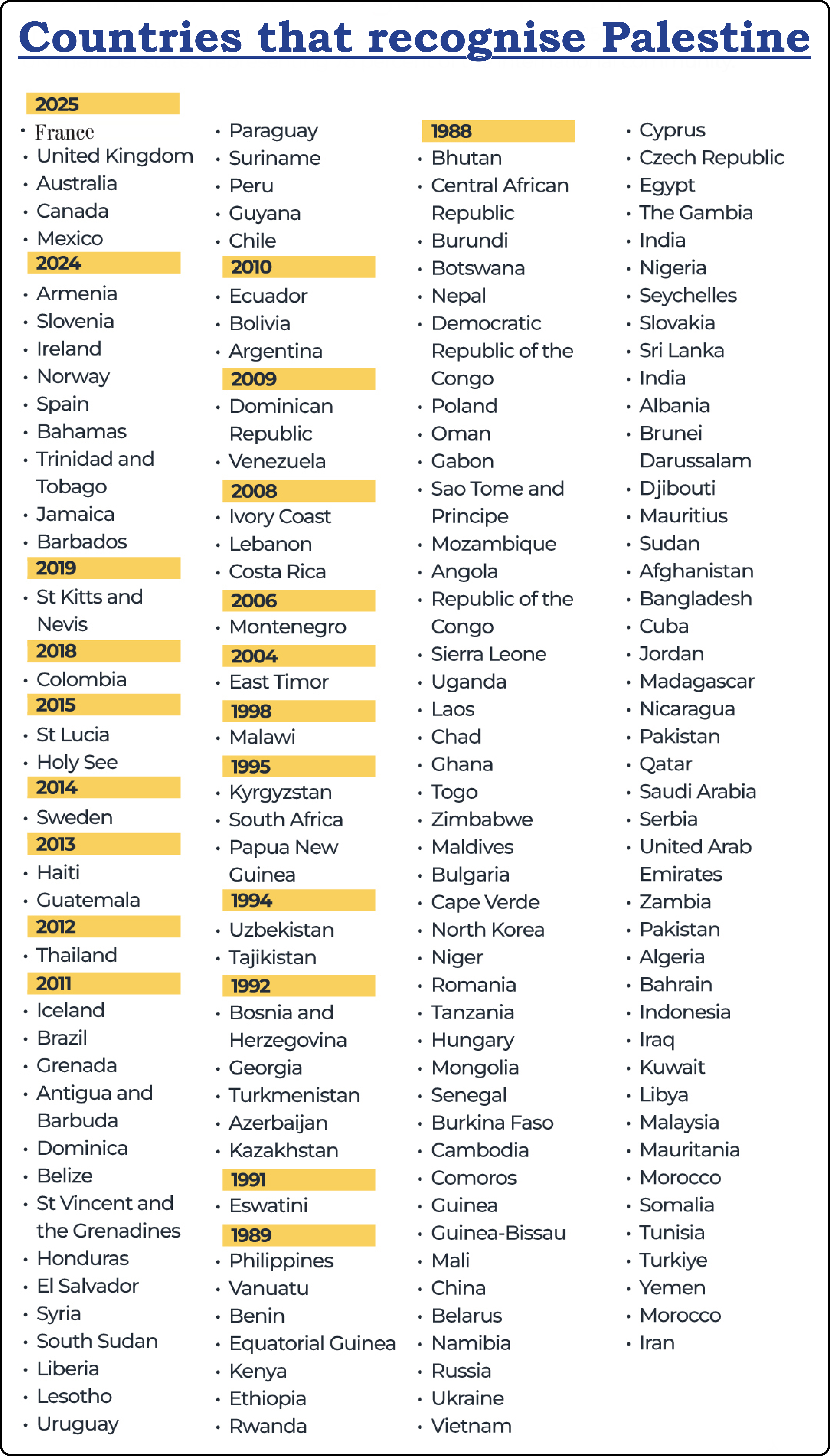Context:
The United Kingdom, France, Canada, and Australia formally recognised the State of Palestine, marking a dramatic change in Western foreign policy. These countries, traditionally cautious about unilaterally recognising Palestinian statehood outside of a negotiated peace process with Israel, have now taken a public stance in favour of Palestinian sovereignty. This move has been widely described as a seismic shift.
Significant of the Seismic Shift:
1. Change among traditional allies
The UK, France, Canada, and Australia have long maintained a cautious balance: supporting Israel’s right to security, while advocating for Palestinian rights in principle. This move signals frustration with previous policies and marks these nations distancing themselves from purely pro‑Israel positions.
2. First G7 recognitions
The UK and Canada become among the first G7 states to recognise Palestine as a state. That elevates the symbolic and diplomatic weight of the act.
3. International pressure during a humanitarian crisis
The recognition comes at a time of acute humanitarian suffering in Gaza and West Bank, with widespread global concern over casualties, displacement, and access to necessities. This context gives urgency and moral dimension to the recognition.
4. Reinforcement of the two‑state solution
With many arguing that the two‑state solution is becoming unviable, the move by major Western states reinvigorates that framework as a diplomatic goal. It sends a message that recognition of statehood can be used as leverage.
Legal & International Law Aspects
-
- Recognition of a state is a sovereign right of each country under international law; it does not automatically confer full UN membership or change control on the ground. The recognised borders, legitimacy, and practical authority depend on negotiations, institutions, and control.
- The role of the Palestinian Authority is under scrutiny—whether it can or will implement governance reforms, hold elections, demilitarise, etc. These are precursors in the eyes of recognizing states.
- Recognition of a state is a sovereign right of each country under international law; it does not automatically confer full UN membership or change control on the ground. The recognised borders, legitimacy, and practical authority depend on negotiations, institutions, and control.
Implications for the Future:
1. For Palestine
o Strengthened diplomatic legitimacy.
o Greater moral and political leverage in international forums (UN, ICC etc.).
o Potential increase in international aid and cooperation, conditional on governance and peace metrics.
2. For Israel
o Increased diplomatic pressure.
o Potential isolation if more allies follow.
o Reactions may include tightening security policies, political rhetoric backing annexation, or shifting alliances.
3. For the Two‑State Solution
o A renewed push for negotiations, though with much mistrust.
o Possible redefinition of what steps are prerequisites: recognition by key powers, ceasefires, settlements freeze, etc.
4. Global & Regional Diplomacy
o Western unity on Israel–Palestine issue is showing cracks; this might lead to new groupings and alignments.
o The recognition may influence other countries in Europe, Latin America, Asia to formally recognise Palestine.
5. India and Other Countries
o India has historically supported a sovereign, independent, viable, peaceful Palestinian state through peaceful means. This development could impact India’s diplomatic balancing acts.
o It might force diplomacy to deal more directly with changing international norms and coalitions.
Conclusion:
The recognition of Palestinian statehood by the UK, Canada, and Australia in September 2025 represents a turning point in Western foreign policy toward the Middle East. It is both symbolic and practical: symbolic in reshaping norms and alliances; practical in putting pressure on Israel, reviving the two‑state framework, and giving momentum to Palestinian aspirations.







